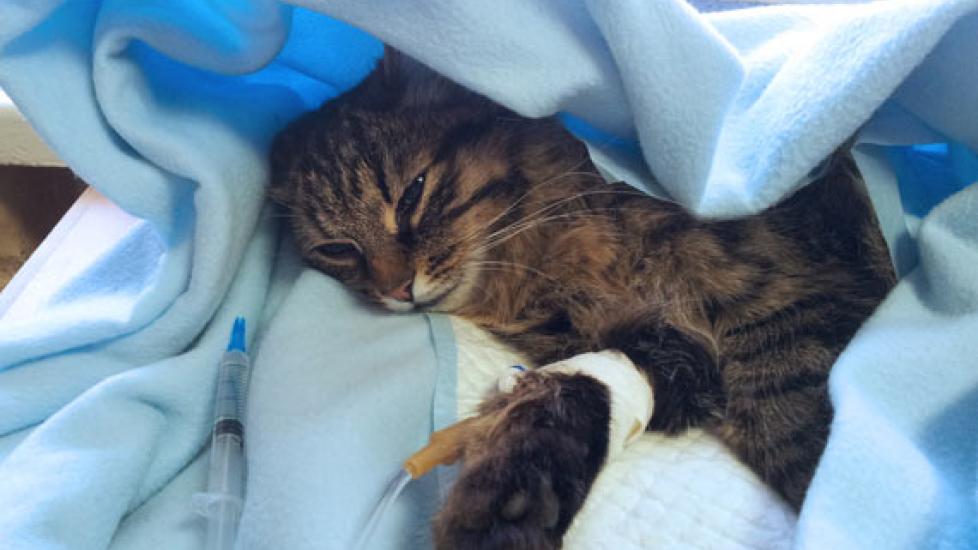The Immune System's Complicated Relationship with Cancer
There appears to be an association between the development of cancer and the ability of tumor cells to evade the immune system. A person’s (or a dog’s or cat’s) immune system is on constant surveillance for foreign substances in the body. Whether searching for rogue bacteria, viruses, or cancer cells, our immune cells constantly prowl for anything not considered “self.”
Tumor cells are devilishly and unexplainably clever, developing mysterious capacities to avoid detection by their host’s immune system. In fact, their existence is often predicated on an ability to co-exist alongside the same cells designed to eradicate them.
Cancer patients are considered to have altered immune systems. The question of whether this alteration is the catalyst for tumor development, or perpetuated by their disease or treatment, or a combination of each of those factors, is an interesting one.
There’s an increased risk of cancer in human organ transplant recipients. These patients are chronically medically immunosuppressed in order to prevent tissue rejection. This is thought to lead to an impaired ability for the recipient’s immune system to survey their body for mutated cells, leading to tumor development.
Organ transplants are infrequently performed in veterinary patients, however it is possible to perform kidney transplants in cats with chronic renal disease. Feline patients are also medically immunosuppressed, just like their human counterparts.
A 2002 study showed that about 10% of feline renal transplant recipients developed lymphoma, with a median time to tumor development of nine months.
A different study conducted in 2009 showed that cats that received transplants had more than six times higher odds of developing malignancy as compared to control cats.
A 2014 study showed a little more than 20% of cats that received kidney transplants, over half of which developed lymphoma. The median interval between transplantation and diagnosis of lymphoma was nearly two years.
When examining the effects of cancer treatment on the immune system, a common consequence of chemotherapy or radiation therapy is something called myelosuppression. Myelosuppresion refers to a decreased number of white blood cells and occurs secondary to the treatment’s negative effect on the production of immune cells. Patients that are myelosuppressed have far fewer cells available to fight off antigens, making them more susceptible to infection.
Myelosuppression does not equate to immunosuppression, however. An immunosuppressed person has a poorly functioning immune system, regardless of the number of cells available at any given time, whereas a myelosuppressed person has normally functioning immune cells, present in greatly reduced numbers.
When it comes to cancer development, one must consider: Does myelosuppression lead to the ability of tumor cells to “slip by” undetected and progress within a host due to failure of adequate recognition?
Individuals with defects/deficits in in their immune system may be potentially predisposed to tumor development. But the larger question in my mind is, “Does the connection between immunity and cancer extend to a point where the immune system can be manipulated to prevent or treat disease?”
A great deal of public attention is given to the implications of cancer and it’s relationship with the immune system. The number of available “success” stories where a person or pet’s cancer was cured with supplements, nutraceuticals, and/or diet changes designed to “boost” immunity suggest the answer is yes.
I’ve written before about my concerns regarding terms such “immune boosting” and why I know that it’s not really possible to do this medically, and why, even if it were possible, this would be a bad thing for the body.
I believe the immune system is a relatively untapped resource for preventing or treating cancer. The relationship is complicated and there is a staggering amount of research aimed at investigating this exact topic.
I appreciate the relationship between immunity and cancer development and possess a desire to further understand the link to be able to provide owners with evidence-based information to help them make the best choices for their pets.
Until that point is reached, I’ll continue to recommend the treatments I am confident in, and I’ll continue to reserve judgment on the alternative treatments until the evidence is on the table.

Dr. Joanne Intile
Image: vnlit / hutterstock
